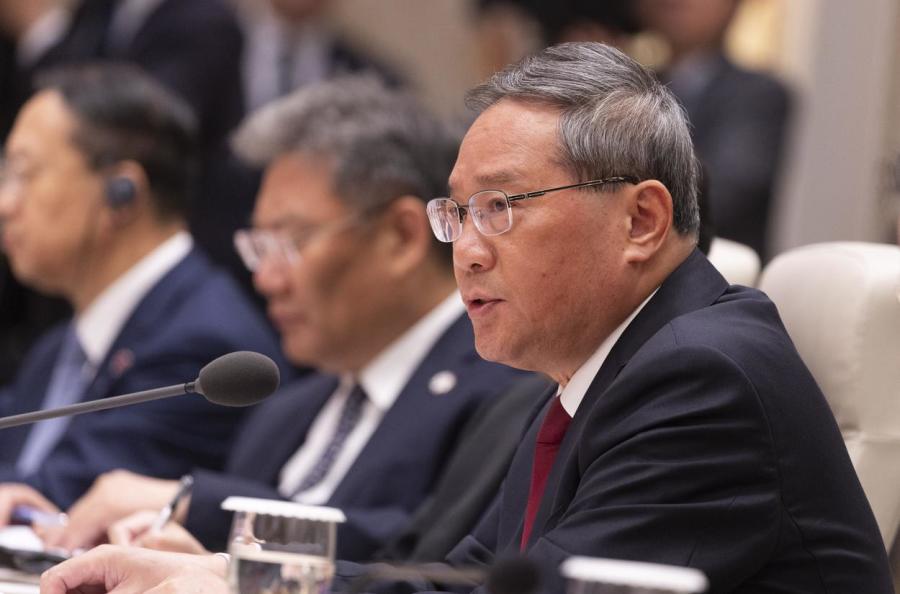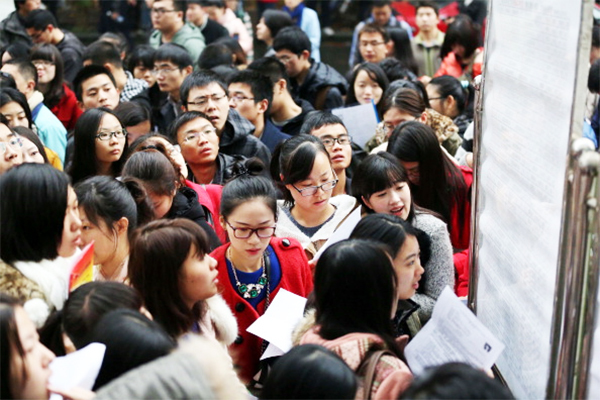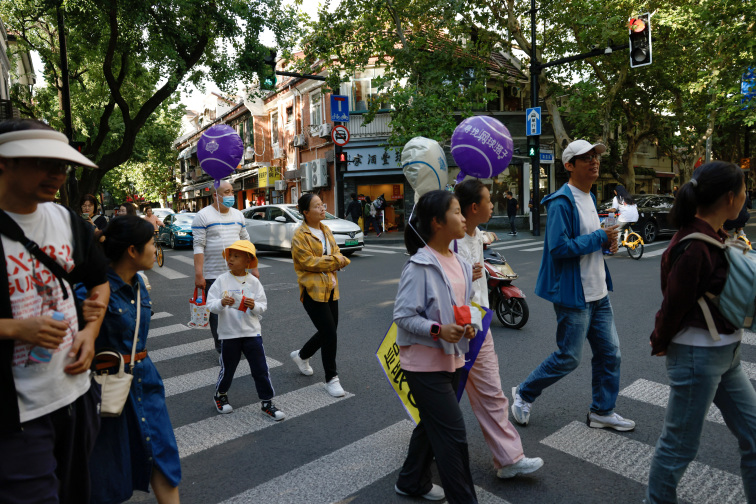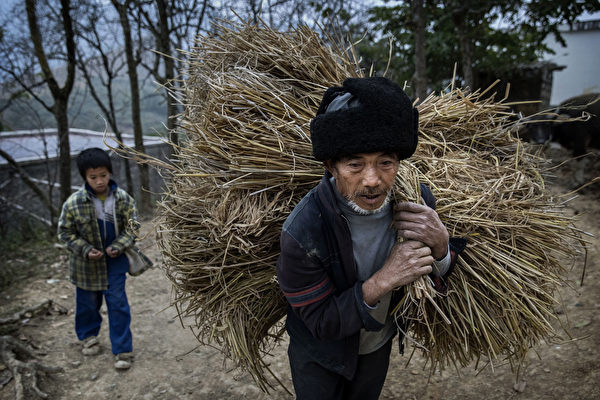The image shows Chinese Premier Li Qiang. (Jeon Heon-kyun - Pool/Getty Images)
[People News] Bloomberg recently reported, citing informed sources, that Chinese policymakers are attempting to boost morale and stimulate spending by granting the first significant pay raise to civil servants nationwide. Salaries are expected to increase by about 500 yuan per month per person, approximately 5%, with the raise retroactively applied starting from July 2024.
Reuters, Voice of America, and other media outlets have also reported this news. A YouTube content creator claimed to have learned from mainland insiders that this raise not only applies to civil servants but also to public-sector employees, including teachers, police officers, and doctors, as well as retirees from within the system. Pensions for retirees are set to increase significantly, with basic salaries seeing an increase of more than 10%. For officials at the ministerial level, monthly salaries will rise by 600 yuan, and for section-level officials, by 400 yuan. The backdated pay raises will also take effect starting July 2024.
This news sparked an uproar online. Critics argue that such a move is a "malicious pay hike" that worsens wealth inequality, encourages hostility between officials and the public, and exacerbates social tensions.
However, the Chinese government has remained unusually calm, refusing to comment on the matter or respond to Bloomberg’s inquiries. It seems the CCP is determined to carry out the raises discreetly, remaining tight-lipped even under pressure.
Some netizens remarked, “This is rescuing officials before rescuing the people. If the officials can’t survive, how can they save the people? Xi Jinping is copying Heshen’s playbook, showing the bureaucracy the way forward. Years ago, Hu Xijin predicted that giving handouts to everyone would be as good as giving nothing.”
How many people are actually within the system? According to data from the National Bureau of Statistics’ 2023 National Economic and Social Development Statistical Bulletin, at the end of 2023, 521.21 million people participated in urban employee basic pension insurance, and 460.44 million participated in corporate employee basic pension insurance. The difference of over 60 million represents the number of individuals within the system. This does not include contract workers affiliated with the system, such as auxiliary police and outsourced personnel. A raise of 500 yuan per month per person would amount to 6,000 yuan annually, totaling 360 billion yuan nationwide per year.
For the 20 million retired individuals within the system, if each receives a 500-yuan monthly raise, the annual cost would amount to 120 billion yuan. The pensions of retired public-sector employees are notoriously high. In 2021, media reports revealed that the number of retirees in Shanghai receiving monthly pensions exceeding 10,000 yuan had surpassed the number of current employees earning over 10,000 yuan per month. Earlier this year, economist Gao Shanwen stated in a speech that provinces with younger populations experience slower consumption growth, while provinces with older populations see faster growth. “Everywhere you look, it’s vibrant elderly people, dispirited young people, and middle-aged people who have lost all hope.” Rather than describing Chinese society as aging, one might call it a society on the brink of collapse.
The 120 billion yuan increase for retirees, combined with the 360 billion yuan for active employees, adds up to 480 billion yuan. Including the raises for contract workers within the system, the national budget will likely require an additional 500 billion yuan annually to cover salaries for officials and their associates.
Who will foot this 500-billion-yuan bill? The options include increasing fiscal deficits, issuing bonds, imposing fines, raising taxes, or printing money—all of which ultimately shift the burden onto the public. Will this spending boost consumption? Civil servants typically do not rely on their salaries for daily expenses. Their salary accounts often remain untouched since government offices and public institutions provide exclusive canteens with subsidized meals. Despite the high-profile anti-corruption campaigns, rent-seeking remains prevalent, with bribery and illicit transactions continuing unabated. This pay raise, therefore, is unlikely to stimulate consumer spending significantly.
Can Raising Salaries for Civil Servants Break Deflation and Restore Confidence? Clearly, it cannot. Zhongnanhai is calculating political gains, not economic ones. Xi Jinping’s favorite governing tactic is political calculus. After three years of the pandemic and economic decline, many civil servants across China either haven’t received their wages or have seen significant pay cuts. Officials have resorted to “lying flat,” shirking their duties, and waiting for Xi Jinping and the Party Central Committee to falter. Xi’s anti-corruption campaigns have cut off the income streams of these officials, alienating them further. The bureaucracy is fragmented, riddled with resentment, and morale is at an all-time low. Social unrest is escalating, people are yearning for change, and tensions between officials and the public are growing increasingly severe. Xi Jinping's regime teeters on the edge of collapse. Faced with this crisis, the solution has been to save the officials, not the people—rescuing officials as if extinguishing a fire. The government still depends on police for stability, schools for ideological indoctrination, and civil servants for enforcing stalled policies.
This low-profile salary increase from Zhongnanhai reveals another issue: the so-called economic stimulus measures announced earlier have had minimal impact. The Ministry of Finance’s 10 trillion yuan allocation to resolve local government debt barely covers the interest on existing debts, offering no real relief for local financial woes. The economy remains bleak, with the real estate bubble bursting, manufacturing facing overcapacity, over 12 million college graduates struggling to find jobs, the yuan's exchange rate slipping past the 7.3 mark, and Trump-era tariffs looming. With so many entrenched issues, stabilizing the morale of officials has become the priority. The CCP has opted for a low-key move, using pay raises to ease tensions.
Without financial relief at the local level, even Zhongnanhai won’t have peace. Tensions between Premier Li Qiang and Public Security Minister Wang Xiaohong have already surfaced regarding distant-water fishing issues.
The Financial Times reported late last year that, based on documents from China’s securities regulatory authorities, 82 cases involving distant-water fishing companies were linked to publicly listed firms in 2024. Previously, Radio Free Asia reported that Guangdong’s Provincial Intelligence Report disclosed nearly 10,000 private companies in Guangzhou alone were subjected to cross-provincial crackdowns in 2023. Most of these cases exhibited signs of profit-driven law enforcement. According to the Ministry of Finance’s website, non-tax revenue—primarily from fines—increased by 13.5% year-on-year in the first three quarters of 2024.
On December 16, 2023, Li Qiang addressed a State Council "special study" session, calling for standardized administrative law enforcement and launching a campaign to regulate corporate-related enforcement actions. People’s Daily and other outlets published editorials emphasizing the need to crack down on profit-driven law enforcement, particularly in distant-water fishing. However, Public Security Minister Wang Xiaohong has paid no heed to these directives, with police departments continuing their independent cross-jurisdictional operations.
On January 3–4, the National Propaganda Ministers’ Meeting was held in Beijing, attended by more than 100 ideology officials from across the country. During the meeting, Cai Qi emphasized the need to improve economic propaganda, injecting confidence into economic and social development. In other words, the focus is to promote a narrative of economic optimism, tell a positive “China story,” and cover up “China accidents.” Naturally, this story of civil servant pay raises is one that cannot be told—if revealed, it would turn into yet another “China accident.”
The CCP’s economic strategy has gone from the “dual circulation” model (domestic and international) to solely domestic circulation, and now to circulation solely within the system itself. Each cycle leads nowhere but deeper into stagnation.
(First published by People News)











News magazine bootstrap themes!
I like this themes, fast loading and look profesional
Thank you Carlos!
You're welcome!
Please support me with give positive rating!
Yes Sure!